Cairo, Egypt
Sightseeing
Saturday, December 29, 2007
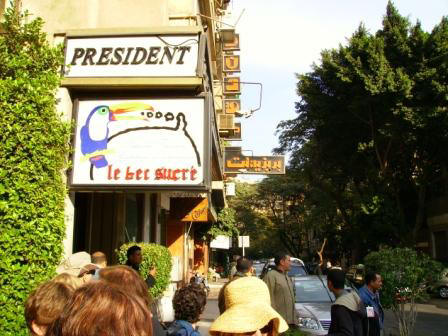
The hovel.
We had to get up at 4:00 a.m. this morning to catch our cab
to the airport from Canterbury. We were a bit sleepy, and it was very dark all the way to the airport, but the
trip was uneventful. It was good that we arrived at the airport early,
as it made checking in much less of a hassle.
The flight from England to Cairo was about four hours on
BMI (the British "el cheapo" airline). I have developed this very annoying
cough, which is driving me nuts—and everyone near me too. But other than
driving people crazy with my constant coughing, the flight was uneventful.
From Julia: We decided that it's worth avoiding 7 a.m. flights for later ones that
allow the luxury of staying in bed until after dawn whenever possible.
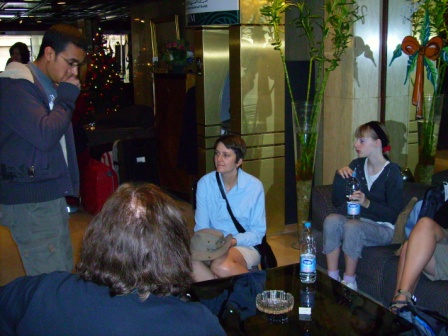
Mohamed (standing left) briefing us in the lobby of the hovel.
We landed at Cairo airport at 5:00 p.m. local time and
experienced for the first time the unusual Egyptian security ritual with
metal detectors. We had to pass through a metal detector on the way out of
the airport just as you would expect to do while going into an airport in
the West. But this is not the really strange behavior. The odd thing
was that the security staff watched "uninterestedly" as we passed through
the detector, setting off all of the alarms!
We looked wide-eyed from our taxi as we drove from the
airport to the hotel. Cairo was not too unlike Buenos Aires, which I visited
recently, in its rough, dirty, and chaotic appearance—except all the signs
were in Arabic. At times, the road would split into two lanes, which everyone
immediately used as a three-lane road, passing within inches of each
other as casually as you might walk around a park. We arrived at our hotel
(the President Hotel); or as we would come to call it, the hovel. I have
stayed at some bad hotels in my time, but this one was the worst so far. The
main problem was the moldy smell in the bathroom, which we soon
discovered was due to water spilling out of the shower all over the
floor uncontrollably every time you took a shower. One of the two elevators
did not have doors, so as you rode it, you could see the elevator shaft
passing by; it's the little things that count. Julia
and I had several tasks to complete before we retired to our hovel for the
evening.
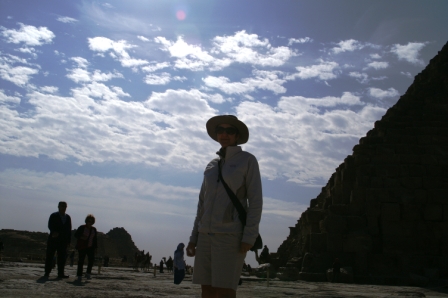
Seeing the Pyramids was all we could think of.
We had to make contact with the tour group, which we did
by meeting our tour guide, whose name was—you guessed it—Mohamed. He
turned out to be a wonderfully nice chap, a young bloke and very eager to
please. After speaking with him, we checked all of our paperwork we needed
to present him the next day, one of which was our trip insurance. We
discovered that Egypt was not listed on our insurance, so we decided to
email the insurance company to see if we could get them to verify that we
were covered in Egypt. This turned out to be a major task as we had to leave
the hovel and find an internet café, which was down the street and then down
a very dark lane. But we made it safely, and, more amazingly, only several minutes
after sending our email, the insurance company replied with the
confirmation we requested. We were able to have the internet café attendant print it
out—what an achievement!
Next, we walked to the main road to locate a cell phone shop and buy a local SIM
chip for my cell phone. This too we achieved with minimal fuss.
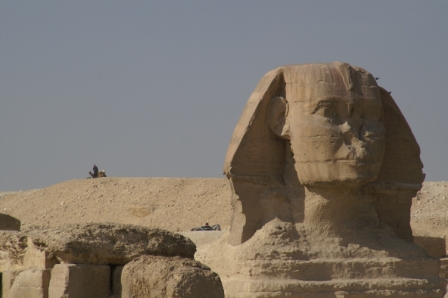
This is why we had come all this way.
The last task before returning to our hovel was to get
dinner. Eating in Egypt, I was advised by at least ten people in England who
had been there, is a tricky and often debilitating thing, so we were looking
carefully at all of our options before committing. We found a restaurant
that served us pizza, water, and a non-alcoholic beer. It was very, very
ordinary and very, very cheap. But it did not make us sick, so we
considered ourselves lucky and returned to our hovel, feeling we had achieved
our first success of the trip.
We kept reassuring ourselves that despite the horror of
the hovel and our absolute exhaustion, we would be seeing the Pyramids tomorrow.
It's great to feel we are on the first independent steps of our adventure,
managing, after 24 hours, to fend for ourselves!
Sunday, December 30, 2007
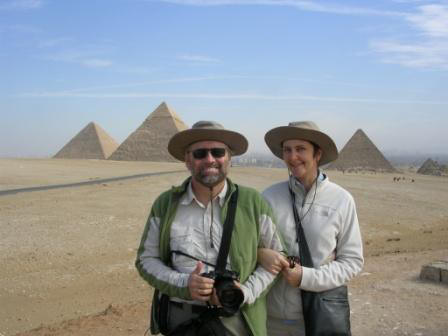
Here is a shot of Julia and me standing on the high
Giza Plain looking down on all the Pyramids.
The next day, we woke up eagerly at 7:00 a.m. and worked
through the meager (and always potentially dangerous) breakfast offerings of
the hovel. We met up with our tour and boarded the bus for the Giza Plain
and the Pyramids! This was something I have wanted to do for as long as I
can remember, and it was worth all the horrors to stand
before them. Of course, before we could "stand before them," we all had to
get off the tour bus "without our bags" and pass through another
Egyptian metal detector. I guess the officials were not concerned about us leaving our bombs, knives,
and guns in our bags on the bus, which we immediately re-boarded to drive to
the site!
The place was very crowded with tourists and hustlers.
The hustlers would try to have their picture taken with you, sell you things
you did not want, and get you to go for a ride on their camels, donkeys,
horse-drawn carriages, and anything else they could make money from. This got a bit
annoying as some of them were quite pushy.
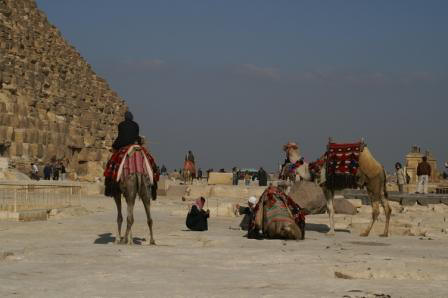
Here is a shot of the typical scene at the base of each
Pyramid.
From Julia: The Pyramids were as wonderful as I had
imagined them to be. It was amazing to hear about how they looked 4,500 years
ago when they were still covered in white limestone with hieroglyphics and
paintings. Amazingly, you can still almost make out some color on
the Sphinx's headdress. We learned that the Nile flowed past the
Sphinx, which is how they managed to transport the granite used in its
construction.
After the Pyramids and Sphinx, we had a quick pit stop at a papyrus shop, ate
falafel sandwiches on the bus, and headed off to the Egypt Museum.
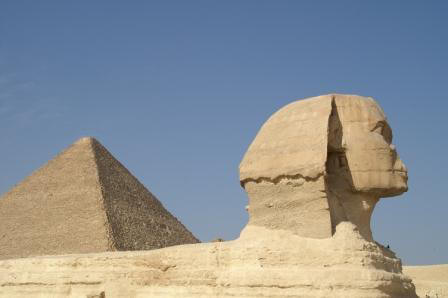
The Sphinx.
A new museum is being built next to the Giza Pyramids,
supposed to take 5 years to construct and then another 5 years to transfer the
125,000 objects from the old museum. In the meantime, the original
museum is in downtown Cairo. It dates from the turn of the century, and it's
incredibly atmospheric. It seems that nothing's been dusted or cleaned since
1920, and all the items have their original typewriter labeling. The place is
completely stuffed with artifacts. We saw the Tutankhamen mask and lots
of the loot from his tomb, as well as amazing statues, papyrus paintings,
jewelry, chariots, etc.
From Julia: After such a wonderful day, we went for a
traditional Egyptian meal with the group; my mum will be proud to know we
"bonded." We stopped at a supermarket on the way home for goodies to keep us
going through our 9-hour train journey tomorrow to Luxor.
Monday, December 31, 2007
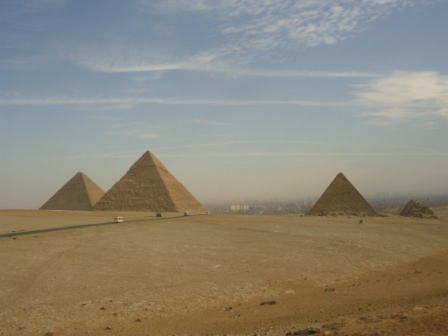
The very old with the new in the background.
We had to rise at 6:00 a.m. this morning to ensure we would
not be late for our train from Cairo to Luxor. Last
night, Mohamed gave us a briefing about what to expect while traveling on
the train. He advised us not to buy any of the food on the train other than
tea and coffee and to bring our own toilet paper.
I should have realized with that comment what was in
store for us, but as a typical bright-eyed and bushy-tailed tourist, it did
not register at the time. Someone asked Mohamed what the toilet facilities
would be like on the train, and he said, "They will start off good but by the
end of the 9-hour trip, they will be very bad." Now, after using the toilet
first thing in the morning, I realize Mohamed uses a different reference
scale than I do when he uses the words, "they start out good." Embarrassment
precludes me from describing in any detail what the toilets were like on the
train—let me just say they were despicable. Another interesting
miscommunication was Mohamed assuring us that we were traveling in the
first-class section of the train. I have been on a few train rides over the
years, and I can assure you an Egyptian first-class train is no kind of first
class I have ever seen.
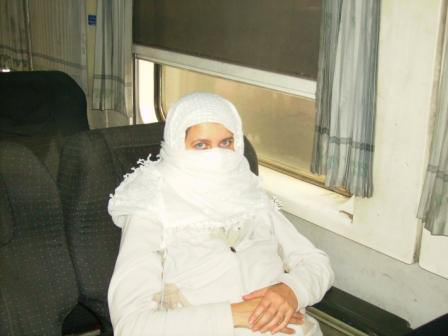
Here is a shot of Julia looking all "Muslimy."
From Julia: One small detail David didn't mention is that
according to Mohamed, 97% of Egyptian men smoke so that they can "be real
men." This means we are breathing in vile second-hand smoke all the time.
Tobacco control is definitely needed here, and it makes me realize how
little tobacco companies need to care about their markets in the U.S. when
they have addicted 50% of the population in places like Egypt. Lawrie, I
know you are no longer a customer.
We asked Mohamed about culture in Egypt, such as the
status of women and how gay people are treated here. He said that women are
free to do whatever they want, but being gay is unacceptable. "It is against
the law of Allah, and the law states that all gays should be executed, the
same as child molesters and drug dealers." We explained we were from the gay
capital of America and believe everyone deserves equal rights. He was not
moved by our sentiment.
Before we started our trip, Mohamed suggested we all
"keep an open mind about people, places, and cultures, and be prepared to
change your views." Mohamed told us he wants to travel. Julia and I gave
him back his advice.
Cairo Video 01
Cairo Video 02
Giza Video 01
Giza Video 02
Sphinx Video
Train Video